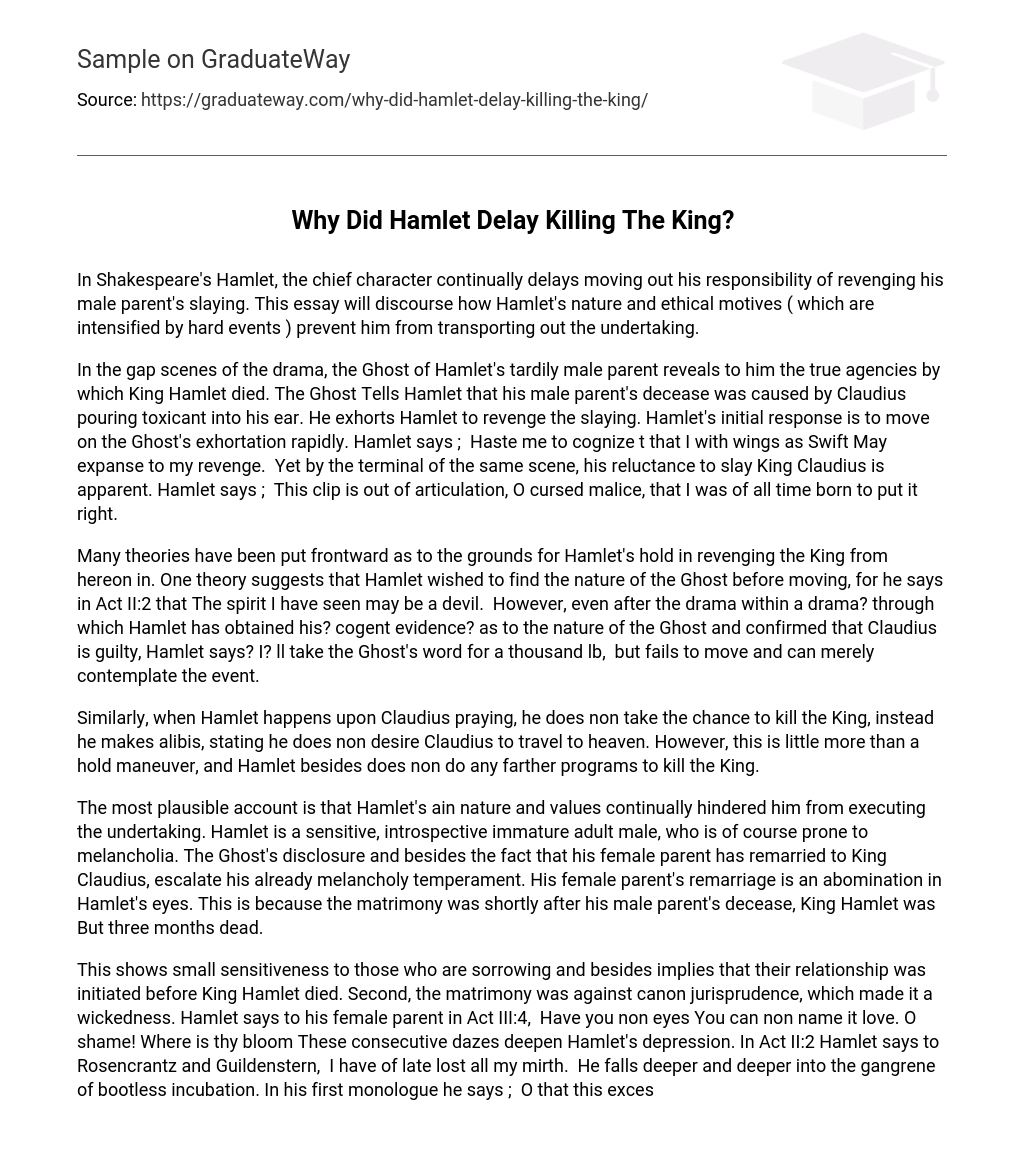In Shakespeare’s Hamlet, the chief character continually delays moving out his responsibility of revenging his male parent’s slaying. This essay will discourse how Hamlet’s nature and ethical motives ( which are intensified by hard events ) prevent him from transporting out the undertaking.
In the gap scenes of the drama, the Ghost of Hamlet’s tardily male parent reveals to him the true agencies by which King Hamlet died. The Ghost Tells Hamlet that his male parent’s decease was caused by Claudius pouring toxicant into his ear. He exhorts Hamlet to revenge the slaying. Hamlet’s initial response is to move on the Ghost’s exhortation rapidly. Hamlet says ; Haste me to cognize t that I with wings as Swift May expanse to my revenge. Yet by the terminal of the same scene, his reluctance to slay King Claudius is apparent. Hamlet says ; This clip is out of articulation, O cursed malice, that I was of all time born to put it right.
Many theories have been put frontward as to the grounds for Hamlet’s hold in revenging the King from hereon in. One theory suggests that Hamlet wished to find the nature of the Ghost before moving, for he says in Act II:2 that The spirit I have seen may be a devil. However, even after the drama within a drama? through which Hamlet has obtained his? cogent evidence? as to the nature of the Ghost and confirmed that Claudius is guilty, Hamlet says? I? ll take the Ghost’s word for a thousand lb, but fails to move and can merely contemplate the event.
Similarly, when Hamlet happens upon Claudius praying, he does non take the chance to kill the King, instead he makes alibis, stating he does non desire Claudius to travel to heaven. However, this is little more than a hold maneuver, and Hamlet besides does non do any farther programs to kill the King.
The most plausible account is that Hamlet’s ain nature and values continually hindered him from executing the undertaking. Hamlet is a sensitive, introspective immature adult male, who is of course prone to melancholia. The Ghost’s disclosure and besides the fact that his female parent has remarried to King Claudius, escalate his already melancholy temperament. His female parent’s remarriage is an abomination in Hamlet’s eyes. This is because the matrimony was shortly after his male parent’s decease, King Hamlet was But three months dead.
This shows small sensitiveness to those who are sorrowing and besides implies that their relationship was initiated before King Hamlet died. Second, the matrimony was against canon jurisprudence, which made it a wickedness. Hamlet says to his female parent in Act III:4, Have you non eyes You can non name it love. O shame! Where is thy bloom These consecutive dazes deepen Hamlet’s depression. In Act II:2 Hamlet says to Rosencrantz and Guildenstern, I have of late lost all my mirth. He falls deeper and deeper into the gangrene of bootless incubation. In his first monologue he says ; O that this excessively excessively solid flesh would melt. Therefore, the undertaking is excessively burdensome for the fragile, melancholy Hamlet.
In add-on, Hamlet was a philosopher instead than a adult male of action, unlike Claudius and Laertes. He himself sees that one of his jobs is to believe excessively exactly on the event. He is rational and brooding, preferring to chew over instead than take action.
Hamlet besides delays killing the King because he is diffident of the morality of transporting out such a undertaking. This factor is of import as Hamlet is a really idealistic and moralistic individual. Retaliation was prohibited by ecclesiastical jurisprudence, but the responsibility of personal honor prevalent in Elizabethan times frequently won through. In the drama, Hamlet debates the morality of retaliation, stating that Is nt non perfect scruples and International Relations and Security Network T non to be damned to allow this canke of our nature come in farther evil.
At this phase it is clear that Hamlet is holding serious uncertainties about killing the King. After all, to kill an anointed King, even in an act of retaliation, was considered a serious offense. Furthermore, as Hamlet points out in the above quotation mark, he would be transporting out the really act he was reprobating. In add-on, in respects to his female parent’s wickedness, the shade had told Hamlet to go forth her to heaven. This creates a moral quandary for Hamlet because if it is God’s responsibility to cover with his Mother’s wickedness, certainly the same applies to Claudius.
In decision, Hamlet delays in killing the King because of his ain character ; he is a philosopher and is of a melancholy temperament. External events in the drama do non lend to Hamlet’s hold, but are instead used to Hamlet’s advantage as alibis to farther hold revenging his male parent’s slaying.





